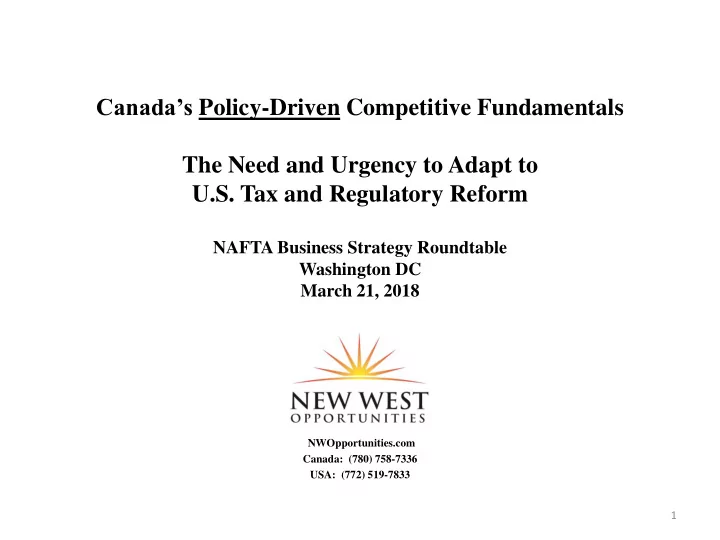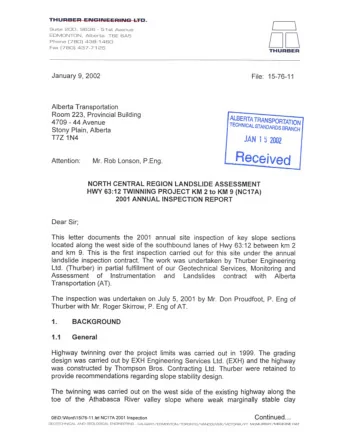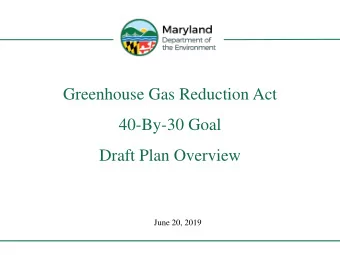
NWOpportunities.com Canada: (780) 758-7336 USA: (772) 519-7833 1 - PowerPoint PPT Presentation
Canadas Policy-Driven Competitive Fundamentals The Need and Urgency to Adapt to U.S. Tax and Regulatory Reform NAFTA Business Strategy Roundtable Washington DC March 21, 2018 NWOpportunities.com Canada: (780) 758-7336 USA: (772)
Canada’s Policy-Driven Competitive Fundamentals The Need and Urgency to Adapt to U.S. Tax and Regulatory Reform NAFTA Business Strategy Roundtable Washington DC March 21, 2018 NWOpportunities.com Canada: (780) 758-7336 USA: (772) 519-7833 1
Fact Check 76% of Canadian exports – 30% of our GDP – goes to the U.S. trade accounts for only 12% of U.S. GDP in Mexico, NAFTA’s Third Amigo, trade accounts for 38% of GDP the U.S. accounts for 25% of the global economy in comparison, Canada represents just under 2% of the global economy Implications of the North American economic reality for Canada? For the so- called “Have Provinces” such as Alberta? For Alberta’s economy, businesses, workers and residents? 2
Conclusions failure on NAFTA renegotiation is not an option NAFTA and Canada/U.S. trade, investment and supply chain integration are well beyond the point of no return at this point, there is no Plan B that doesn’t involve significant economic disruption, dislocation and risk to all regions of Canada An Ideologically-Driven Deer Caught in the High-Beams? Canadian policy-makers have yet to show that they fully realize the need (jobs, investment, future prosperity) and are prepared to act decisively to adapt to the dramatically-changing, pro-competitive, pro-growth economic environment in the U.S. (“The Trump America First Doctrine”) 3
The Trump Doctrine / Risks and Opportunities AMERICA FIRST! “Our aim is to meet the simple, but crucial demand of our citizens – a government of the People, for the People and by the People – that truly puts the needs of our People first.” “Putting America First means we must always make the safety of our People the number one priority – because without safety and strong national security, their can be no prosperity.” “Every public policy silo – from national defense, to government services, taxation and regulation, to infrastructure, immigration and trade – will now all be governed by this America First doctrine. This is the sacred mandate the People have entrusted to me and my Administration.” 4
The Trump Doctrine / Risks and Opportunities Business, Trade Competitiveness and Trade Imbalances Discussion: Key Players/Advisors to the President: > Mike Pence (Vice-President) > Mike Pompeo (CIA/nominee for Secretary of State) > Steve Mnuchin (Treasury) > Wilbur Ross (Commerce) > Mick Mulvaney (OMB) > Robert Lighthizer (USTR) > Scott Pruitt (EPA) > Nikki Haley (U.N. Ambassador) > Rick Perry (Energy) > Paul Ryan (House Speaker) > Peter Navarro (White House Director, Trade and Industrial Policy) 5
The Trump Doctrine / Risks and Opportunities 2017-2018 Targeted (Priority) Deliverables: deregulation and regulatory streamlining (a focus on regulatory efficiency and effectiveness) * * Council of Economic Advisers: (1) excessive regulation has cost the U.S. economy 0.8% of GDP, per year, since 1980; (2) assuming, for illustrative purposes only, that 1980 U.S. industry/business regulatory frameworks had remained unaltered, the U.S. economy would have been 25% larger in 2012 comprehensive pro-growth U.S. personal and corporate tax reform “renegotiate” multilateral frameworks deemed to no longer be in the best interests of the American people and/or pursue more direct, bilateral approaches (NAFTA, TPPA, Paris Climate Accord) establish and develop direct, respectful and real-time working relationships with key world leaders and allies 6
Competitiveness Implications and Risks for Canada Highlights of the $1.5 trillion U.S. Tax Cuts and Jobs Act (TCJA): U.S. federal corporate income tax rate reduced from 35% to 21%, effective January 1, 2018 new combined U.S. federal-state corporate income tax rate falls significantly from 39.1% to 26%, and is now slightly lower than the Canadian federal- provincial corporate income tax rate of about 26.7% (weighted by GDP for sub-national jurisdictions) a move to full expensing (as opposed to depreciating) business investments until 2022, a new “Territorial Approach” to taxation (addressing previous competitiveness concerns), incentivizing the repatriation of offshore retained earnings, etc., etc. 7
Competitiveness Implications and Risks for Canada NOTE: Includes corporate income taxes, sales taxes on capital purchases, transfer taxes and other capital-related taxes as a share of gross profits. 8
Competitiveness Implications and Risks for Canada What did our Economics Panel and Roundtable Survey have to say? “In the short term, Canada clearly stands to benefit by exporting more goods and services to a now rapidly-expanding U.S. market, assuming that the current NAFTA negotiations continue and can be successfully concluded.” “However, a more tax -competitive environment south of the border, and the continuing beat of America First protectionist drums, would also be expected to draw capital and skilled labour from Canada to the larger U.S. market…and increasing so over time. This is not a risk to be ignored!” “Canada’s formerly favourable position in corporate taxation has definitely eroded considerably, with the U.S. now holding the edge.” “U.S. tax reform, along with growing NAFTA uncertainties, increases the likelihood of a slow bleed of investment from Canada to the U.S.” “With a revitalized U.S. tax code, CEOs have another reason to locate in, or worse yet, relocate to the U.S.” 9
Competitiveness Implications and Risks for Canada What did our Economics Panel and Roundtable Survey have to say? “Compounding the challenges we face, businesses may also become tentative on betting too heavily that Canadian exports will continue to have unfettered long term access to the U.S.” “The U.S. personal and corporate tax changes are, without doubt, game - changers.” “Canada’s tax -and-spend federal and provincial governments need to quickly realize and act in re- leveling the playing field between our two countries… preferably, before too many companies’ tax planning and investment location decisions result in Canadian jobs being exported south of the border.” “Ideology, the influence of eco -activism, and a general level of concern with the new U.S. Administration – within the current federal, Ontario, Quebec, Alberta and B.C. governments – will most likely delay meaningful action on what will soon become a bread-and-butter issue for the same types of people who elected Donald Trump. Tough times ahead, as Alberta is now finding out on pipelines.” 10
Competitiveness Implications and Risks for Canada Takeaways: Failure on NAFTA renegotiation is not an option, nor is failure to rebalance the trade, investment and corporate taxation playing field between Canada and the U.S. We are the proverbial “price taker” in these areas and need to respond as prudently, expeditiously and in the best interests of all Canadians under the circumstances we find ourselves in. Apologies to my social and environmental friends and activist neighbours, but bread- and- butter issues now require attention and action from our political leaders… presumably who will also be acting in the best interests of all Canadians and all regions of Canada. Overriding Concern: To restate , Canadian policy-makers have yet to show that they fully realize the need (jobs, investment, future prosperity) and are prepared to act decisively to adapt to the dramatically-changing, pro-competitive, pro-growth economic environment in the U.S. It has happened, is happening, and strong “Canada First” entrepreneurial leadership is urgently required. 11
Recommend
More recommend
Explore More Topics
Stay informed with curated content and fresh updates.























